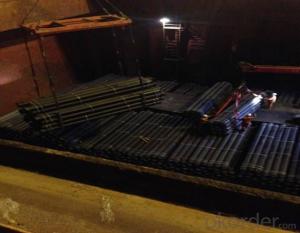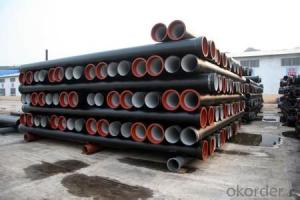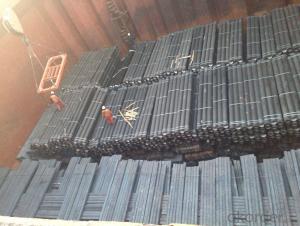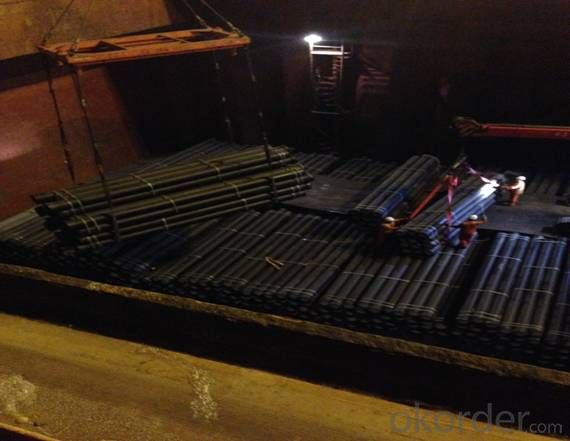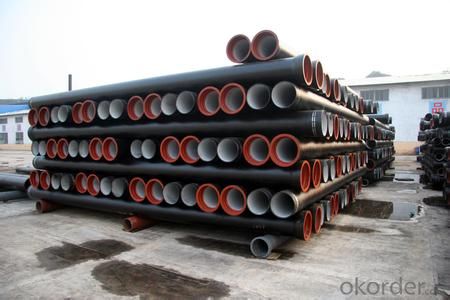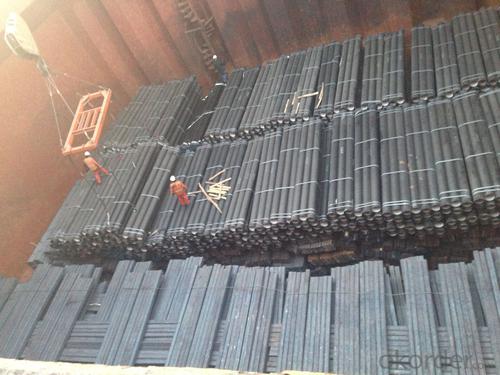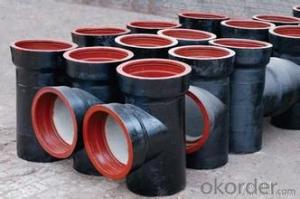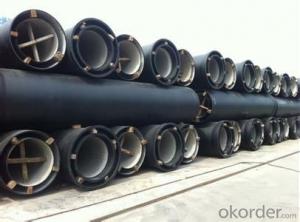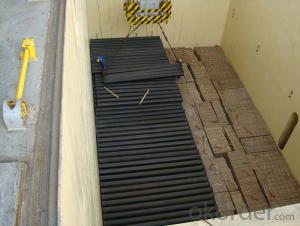DUCTILE IRON PIPE K9 DN1400
- Loading Port:
- China Main Port
- Payment Terms:
- TT OR LC
- Min Order Qty:
- -
- Supply Capability:
- -
OKorder Service Pledge
OKorder Financial Service
You Might Also Like
Ductile Iron Cast Pipe is without any defects compare with tradition casting tech, which has many advantages particularly as follow:
(1) High density. In the "vertical upward casting" process, the melt iron of centre liquid column in center crystallizer is continuously feeding for volume shrinkage caused by condensation tube at outer circumference , which lead to be free of shrinkage porosity.
(2) High purity. When melt iron pouring, the mixed impurities such as gas, dross, sand grain which are lighter than melt iron could be eliminated at furnace mouth, its impossible to enter into the crystallizer through the channel, so the melt iron into the crystallizer is very pure.
(3) Strength with toughness. The cooling speed provided by continuous crystallizer is 30 times than sand casting and 5 times than centrifugal casting, and doesn't produce white iron, the eutectic cell volume of continuous cast iron is one eighth to one tenth compare with traditional cast iron. The density of graphite nodule in ductile iron can reach 300-700 pcs/mm2. Therefore, all reason above improve the strength and toughness of continuous cast iron.
(4) Free machining. The high speed cooling make the hardening phase (such as boride, steadite) not appear like reticular, massive or thick, but diffuse like fish bone and pane in shape, moreover, there are tiny graphite flakes inlaid hardening phase. It's free machining in BrinellHardness the range of 250-300HB. However, the Brinell Hardness of 250 is top limit to common metal materials.
(5) Uniform composition of tube wall. The convection mixing of liquid column caused by marching type drawing in crystallizer make the composition of tube wall well-distributed, and concentration gradient very little.
(6) High productivity. To the wall thickness of tube under 10mm, the speed of continuous casting is 1 meter/min, to the wall thickness of tube under 20mm, the speed of continuous casting is 0.5 meter/min, which is high efficiency that centrifugal or other casting tech couldn't reach.
- Q: Can ductile iron pipes be used for offshore oil and gas installations?
- Yes, ductile iron pipes can be used for offshore oil and gas installations. Ductile iron is a type of cast iron that offers excellent strength and durability, making it suitable for various applications including offshore environments. These pipes have high tensile strength and are resistant to corrosion, making them ideal for transporting oil and gas in harsh offshore conditions. Ductile iron pipes are often used for subsea pipelines, risers, and flowlines due to their ability to withstand high pressures and resist external forces such as waves, currents, and impacts. They are also capable of handling the high temperatures and pressures associated with offshore oil and gas production. Furthermore, ductile iron pipes have a long service life and require minimal maintenance, reducing the overall operating costs for offshore installations. They are also readily available and cost-effective compared to other materials such as steel. However, it is important to consider factors such as the specific requirements of the project, environmental conditions, and the compatibility of ductile iron with other materials used in the offshore installation. Proper engineering analysis and design considerations should be undertaken to ensure the suitability and safety of ductile iron pipes for offshore oil and gas installations.
- Q: Can ductile iron pipe be used for industrial wastewater applications?
- Yes, ductile iron pipe can be used for industrial wastewater applications. It has excellent strength, durability, and corrosion resistance, making it suitable for handling various types of wastewater in industrial settings. Additionally, ductile iron pipe is known for its ability to withstand high-pressure and high-temperature conditions, making it a reliable choice for industrial wastewater applications.
- Q: How are ductile iron pipes protected against abrasion or wear?
- Ductile iron pipes are protected against abrasion or wear through various methods and protective coatings. One of the most common methods is the application of cement mortar lining on the inner surface of the pipe. The cement mortar creates a smooth and hard layer that resists the effects of abrasion and wear caused by the flowing water or other materials passing through the pipe. Additionally, ductile iron pipes can be externally protected by applying a bituminous or epoxy coating. These coatings provide a barrier against external factors such as soil or chemicals that may cause wear or corrosion. The coating acts as a protective layer, preventing direct contact between the iron pipe and the surrounding environment. Moreover, for areas with severe abrasion or wear conditions, special linings or coatings can be applied. Polyethylene encasement or polyurethane lining can be used to provide enhanced protection against abrasion, particularly in areas where the pipe is exposed to high levels of turbulence or abrasive materials. In some cases, ductile iron pipes can also be reinforced with additional materials such as fiberglass or steel wire to increase their resistance to abrasion or wear. These reinforcements provide an extra layer of protection, strengthening the pipe and reducing the likelihood of damage. Overall, ductile iron pipes are designed with a combination of protective measures to ensure their durability and resistance to abrasion or wear. These measures include cement mortar linings, protective coatings, special linings or coatings for severe conditions, and reinforcements. These protective methods help extend the lifespan of the pipes and maintain their functionality even in harsh environments.
- Q: Can ductile iron pipes be used for trenchless pipe rehabilitation methods?
- Yes, ductile iron pipes can be used for trenchless pipe rehabilitation methods. Trenchless pipe rehabilitation methods involve repairing or rehabilitating existing pipelines without the need for extensive excavation or trenching. Ductile iron pipes are commonly used in these methods due to their durability, strength, and resistance to corrosion. They can be rehabilitated using various trenchless methods such as pipe lining, pipe bursting, and slip lining. These methods involve inserting a new lining or pipe inside the existing ductile iron pipe, thereby extending its lifespan and improving its structural integrity. Ductile iron pipes are preferred for trenchless rehabilitation as they can withstand the forces and pressures involved in the process while providing a long-lasting and reliable solution.
- Q: What is the expected deflection range for ductile iron pipes?
- The expected deflection range for ductile iron pipes can vary depending on several factors such as pipe diameter, wall thickness, soil conditions, and installation methods. Generally, ductile iron pipes have a higher deflection capacity compared to other materials like PVC or concrete pipes. For smaller diameter ductile iron pipes (up to 12 inches), the expected deflection range is typically around 2-3% of the pipe diameter. This means that a 12-inch ductile iron pipe could deflect up to approximately 0.24-0.36 inches. For larger diameter ductile iron pipes (greater than 12 inches), the expected deflection range can be slightly higher, ranging from 2-5% of the pipe diameter. This means that a 24-inch ductile iron pipe could deflect up to approximately 0.48-1.2 inches. It is important to note that these values are general estimates and should be verified with the manufacturer's specifications or engineering design guidelines for a specific project. Additionally, proper installation techniques and backfilling practices should be followed to ensure the pipe's structural integrity and prevent excessive deflection.
- Q: What is the expected joint flexibility of ductile iron pipes?
- The expected joint flexibility of ductile iron pipes is typically high, as they are designed to accommodate slight movements and stresses caused by ground settlement or thermal expansion and contraction.
- Q: Can ductile iron pipe be used for irrigation pumping stations?
- Yes, ductile iron pipe can be used for irrigation pumping stations. Ductile iron pipe is known for its durability, corrosion resistance, and ability to withstand high pressure and flow rates. It is a commonly used material for water supply systems, including irrigation pumping stations, due to its reliability and long service life.
- Q: Can ductile iron pipes be used for gas distribution systems?
- Certainly, gas distribution systems can utilize ductile iron pipes. The utilization of ductile iron pipes in various infrastructure applications, such as gas distribution systems, is widespread due to their exceptional qualities, including strength, durability, and resistance to corrosion. These pipes are engineered to withstand the high-pressure flow of gas and are suitable for installations both above and below ground. Furthermore, ductile iron pipes exhibit remarkable resistance to external loads, minimizing the risk of damage or fracture, thereby establishing them as a dependable and secure choice for gas distribution systems. Nevertheless, it is crucial to ensure that the pipes receive proper coating and protection against any potential corrosive elements present in the gas or soil to guarantee their longevity and optimal performance.
- Q: How do ductile iron pipes perform in freeze-thaw cycles?
- Ductile iron pipes perform exceptionally well in freeze-thaw cycles. The material properties of ductile iron, such as its high tensile strength and excellent impact resistance, make it highly resistant to the stresses caused by freeze-thaw cycles. Unlike other materials, ductile iron pipes can withstand the expansion and contraction that occurs during freezing and thawing without cracking or breaking. One of the key reasons why ductile iron pipes excel in freeze-thaw conditions is their ability to absorb and dissipate stresses. The high ductility of the material allows it to deform slightly under stress, thereby releasing the built-up pressure and preventing any damage to the pipe. This characteristic ensures that the pipes can handle the repeated cycles of freezing and thawing without compromising their structural integrity. Additionally, ductile iron pipes have a protective and durable coating, such as cement mortar lining or polyethylene encasement, which further enhances their resistance to freeze-thaw cycles. These coatings provide an additional layer of protection and prevent water from coming into direct contact with the iron, reducing the potential for corrosion. Furthermore, ductile iron pipes have a long service life, typically exceeding 100 years. This longevity is attributed to the material's inherent strength and resistance to various environmental factors, including freeze-thaw cycles. The pipes' ability to withstand these cycles without significant damage ensures the reliability and durability of the water distribution system, even in areas prone to freezing temperatures. In conclusion, ductile iron pipes are highly reliable and perform exceptionally well in freeze-thaw cycles. Their high tensile strength, impact resistance, ability to absorb stresses, and protective coatings make them a preferred choice for water distribution systems in regions with harsh winter conditions.
- Q: Classification of cast iron pipes
- Continuous cast iron straight pipe:Continuous cast iron pipe, namely continuous casting gray cast iron pipe, suitable for water and gas pressure fluid delivery.
Send your message to us
DUCTILE IRON PIPE K9 DN1400
- Loading Port:
- China Main Port
- Payment Terms:
- TT OR LC
- Min Order Qty:
- -
- Supply Capability:
- -
OKorder Service Pledge
OKorder Financial Service
Similar products
Hot products
Hot Searches
Related keywords
